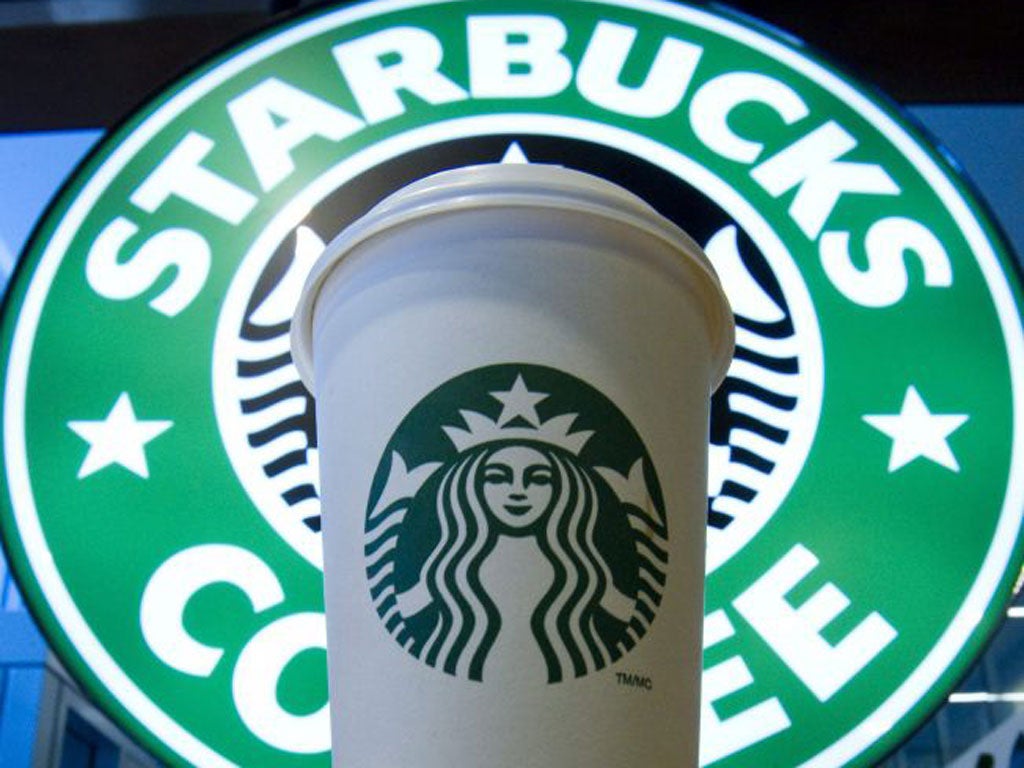Good bean counters? Starbucks has paid no tax in UK since 2009
Probe shows coffee chain used clever accounting to minimise bills – despite UK sales of over £1bn

Starbucks has exploited accounting tricks to pay almost no UK tax on the millions of coffees, sandwiches and cakes bought by the British public over the past decade, it was revealed yesterday.
An investigation showed that the coffee company has paid only £8m in corporation tax to HMRC in the 14 years since it arrived on British high streets, despite generating sales of £3 billion.
Starbucks UK’s accounts shows that it has minimised its tax burden by officially recording losses of tens of millions of pounds year after year.
Yet in its briefings to stock market investors and analysts during the past 12 years, Seattle-based Starbucks has consistently stated that its UK unit is “profitable” and three years ago even promoted its UK head, Cliff Burrows, to run its vastly larger US operation.
According to an investigation by Reuters, the anomaly can be explained by the use of legal accounting techniques which leave the coffee company paying HMRC proportionately less tax than other firms such as McDonald’s and KFC.
The disclosure, which brought immediate condemnation from tax campaigners, follows criticism of the tax record of two other large American corporations, Amazon and Facebook.
In April, Amazon was revealed to be routing its UK sales through its European headquarters in low-tax Luxembourg, meaning that last year its UK corporation tax bill was nil, despite revenue of £3bn from the sale of books, DVDs and other goods.
Most of Facebook’s UK income is thought to be routed through its European HQ in the Republic of Ireland, where corporation tax is lower. It paid tax of £238,000 on £20.4m sales last year, although one estimate puts its advertising revenue at £275m.
There is no suggestion that any of the three companies have broken the law, but Starbuck’s case has aroused particular interest because its almost zero tax bills contrasts so starkly with its bullish message to investors.
The investigation by the Reuters reporter Tom Bergin found that in 2009, Starbucks UK filed a loss of £52m in accounts lodged at Companies House- while its chief financial officer Troy Alstead told investors on a conference call that the UK was “profitable.”
In 2010, the loss was £14m, but Starbucks reported sales growth, and in the year to September 2011 - when the loss was put at £33m - John Culver, Starbucks’ international president, said he was pleased with the UK unit.
In common with other large companies, Starbucks appears to be exploiting differing tax regimes around the world. The coffee company’s UK unit, for instance, is required to pay a royalty rate of 6 per cent of sales to Starbucks for using its intellectual property. It is not clear where this money goes.
However, there is concern in the US that some American firms are using tax havens such as Switzerland - where tax on royalties can be 2 per cent - to collect charges for intellectual property.
Starbucks UK also repays loans to Starbucks at an interest rate set at Libor (London InterBank Offered Rate) plus 4 percentage points, more expensive than similar arrangements at KFC, where the rate is Libor plus 2 percentage points, and McDonald’s, where the rate is at or below Libor.
Michael Meacher, a Labour MP and tax campaigner, complained that Starbucks was behaving in an “extremely unfair” way and acting against the interests of the public, telling Reuters it was “trying to play the taxman, game him. It’s disgraceful.”
Starbucks UK said it was following the rules. In a statement, a spokesman for the company said: “We have paid and will continue to pay our fair share of taxes in full compliance with all UK tax laws, as we always have.
“There has been no suggestion by any authority that we are anything but compliant and good tax payers. We do this in a way that is consistent with the values that have guided us since we were founded more than forty years ago - balancing our need to operate a profitable business with a social conscience.”
Subscribe to Independent Premium to bookmark this article
Want to bookmark your favourite articles and stories to read or reference later? Start your Independent Premium subscription today.

Join our commenting forum
Join thought-provoking conversations, follow other Independent readers and see their replies